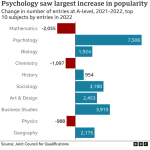“You only need numbers for maths classes”
By Admin, on 12 October 2022
by Jo Van Herwegen
Dyscalculia is a learning difficulty that includes persistent difficulties with understanding numbers and can lead to a number of difficulties related to mathematics, including understanding time and money1. Dyscalculia affects about 1 in every 20 students in a classroom2 and is thought to occur as often as dyslexia.
Despite the fact that dyscalculia and dyslexia have similar frequencies, our latest survey shows that dyscalculia is less well known by the general public and also educators, compared to dyslexia. In our recent focus groups we explored how we can raise awareness about dyscalculia and address why teachers might have fewer knowledge about this learning difficulty compared to dyslexia. One of the hypotheses we explored was that teachers might have fewer opportunities to learn about dyscalculia. Indeed, our survey results show that dyscalculia was less often covered in initial teacher training and that there were fewer training opportunities for continued professional development related to dyscalculia compared to dyslexia. However, participants in our focus groups also stated that there are fewer opportunities to identify children with dyscalculia in the classroom. As one of the teachers stated: “You only need numbers for maths classes, whilst you need good reading abilities for all classes and thus, if you are not teaching maths then you might not notice that the child has any maths difficulties or dyscalculia”.
When reading about the number of A-levels obtained by students this year, I noticed a table with the top 10 A-level subjects and this reminded me of the comment by the teachers about the importance of numbers for maths classes only. The picture below shows the top 10 subjects for A-levels.

(taken from BBC website: https://www.bbc.co.uk/news/education-62498629)
As you can see from this picture, all 10 subjects require being good with numbers:
- Mathematics: I think this one is obvious why number knowledge is important
- Psychology: good number knowledge is important to understand statistical analysis and research outcomes.
- Biology: Understanding numbers allows for description of how molecules move in and out of cells, how bacteria shuttle through blood vessels, how drugs get broken down in the body and many other physiological processes.
- Chemistry: again, this is a more obvious one as students will have to understand formulas, calculate percentages use an appropriate number of decimal places in calculations, e.g. for pH calculation.
- History: well you might need to get your dates right on a history exam and thus need to know the difference between 1465 and 1645.
- Sociology: unless you use quantitative statistical analysis to analyse data from experiments, there isn’t much direct understanding of numbers involved. However, in order to develop sociological models and logical proofs, understanding of mathematical concepts and logical concepts will be beneficial.
- Art & Design: Symmetry, balance, exactness, and proportion are such important parts of a design and art. Proportions and ratios are mathematical concepts that are often used by graphic designers to make their designs well-balanced and attractive.
- Business studies: Business studies require an understanding of elementary arithmetic, elementary algebra, statistics and probability. For some management problems, more advanced mathematics – such as calculus, matrix algebra and linear programming – is applied.
- Physics: Mathematics is often described as an essential tool for Physics and in order to do calculations good number knowledge is required.
- Geography: Different areas of mathematics are used for different areas of geography but good geometry and number knowledge is required to make and read geographical maps.
Seeing that good number knowledge is relevant to most top-10 A-level subjects, it is important that teachers have a good understanding of dyscalculia and how this may affect students in the classroom so that students with dyscalculia can receive support for all school subjects, and not just for maths classes.
Want to find out more about dyscalculia?
Check out our new dyscalculia toolkit: https://blogs.ucl.ac.uk/cdld/2022/10/06/dyscalculia-toolkit/
References
- Van Herwegen, J. (2020). Math Disorder. In: S. Hupp & J. Jewell. The Encyclopedia of Child and Adolescent Development. John Wiley & Sons: Chichester, UK.
- Morsanyi, K., van Bers, B., McCormack, T., & McGourty, J. (2018). The prevalence of specific learning disorder in mathematics and comorbidity with other developmental disorders in primary school-age children. British journal of psychology (London, England : 1953), 109(4), 917–940. https://doi.org/10.1111/bjop.12322
 Close
Close

